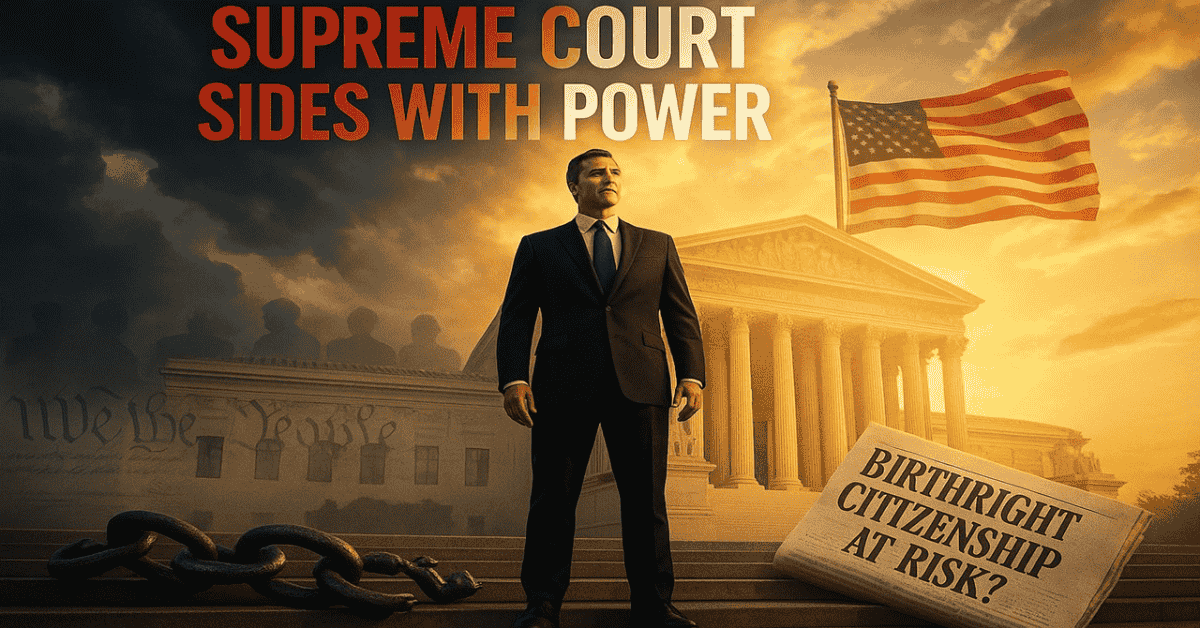Supreme Court Ruling Favors Trump: What It Means for Executive Power and Birthright Citizenship
The U.S. Supreme Court has made a major ruling that could change how executive orders are blocked — and possibly how citizenship is handled in the U.S. Former President Donald Trump praised the decision, calling it a big win for his policies.
Let’s break down what happened, why it matters, and what comes next.
What Did the Supreme Court Decide?
On Friday, the Supreme Court ruled 6–3 to limit the power of lower federal judges from issuing broad, nationwide injunctions that pause executive orders. The decision doesn’t decide whether Trump’s executive order to end birthright citizenship is legal — but it does clear the way for that policy to take effect in many parts of the country.
Under the ruling:
-
Trump’s order cannot take effect for 30 days.
-
After that, the order may apply in 28 states that have not legally challenged it.
-
Judges in states like Maryland, Massachusetts, and Washington had previously blocked the order nationwide — a move the court now says is too broad.
This decision, written by Justice Amy Coney Barrett, came along ideological lines, with six conservative justices in favor and three liberal justices against.
Why Birthright Citizenship Is in Focus
Although the case wasn’t officially about birthright citizenship, it has major implications for it.
Birthright citizenship is the right to automatically become a U.S. citizen if you’re born on American soil, regardless of your parents’ immigration status. This has been U.S. policy since the 14th Amendment was ratified in 1868 — over 150 years ago.
Trump’s executive order aims to change that policy, preventing children born in the U.S. to undocumented immigrants, tourists, or temporary residents from receiving automatic citizenship.
Legal experts and civil rights groups warn this could:
-
Lead to legal confusion across the country
-
Create a “patchwork” of citizenship laws
-
Challenge long-standing constitutional protections
Reactions from Civil Rights Groups and Lawmakers
The ruling sparked strong reactions, especially from Democrats and civil liberties groups.
🗣 Senator Chuck Schumer (D-NY) said the decision was a “terrifying step toward authoritarianism.” He warned that it gives the president too much unchecked power and urged Republican lawmakers to defend democratic values over executive control.
🗣 Civil rights organizations say this ruling weakens the courts’ ability to protect constitutional rights — especially for vulnerable groups like immigrants and their U.S.-born children.
🗣 Progressive legal experts call the decision a threat to decades of settled law, saying it could open the door for more extreme actions from future presidents.
Why the Case Was Unusual
Interestingly, the Supreme Court didn’t review the usual kind of petition for this case. Instead, they focused only on whether the trial courts’ injunctions were too broad — not on whether the birthright citizenship order itself is constitutional.
Justice Barrett’s opinion emphasized that lower courts cannot block a policy for the entire country unless Congress gives them that authority.
What Happens Next?
While Trump’s order to change birthright citizenship is still under legal review, the court’s decision means it can start to take effect in most states soon — unless new lawsuits are filed.
Meanwhile, this ruling may also affect future presidents by giving them more freedom to carry out executive orders without nationwide pushback from a single judge.
The Supreme Court’s decision is a big deal — not just for Trump, but for how much power any president can have. It raises serious questions about the balance between branches of government and the protection of civil rights.
Whether you’re for or against the decision, one thing is clear: the rules of power are shifting in America.
